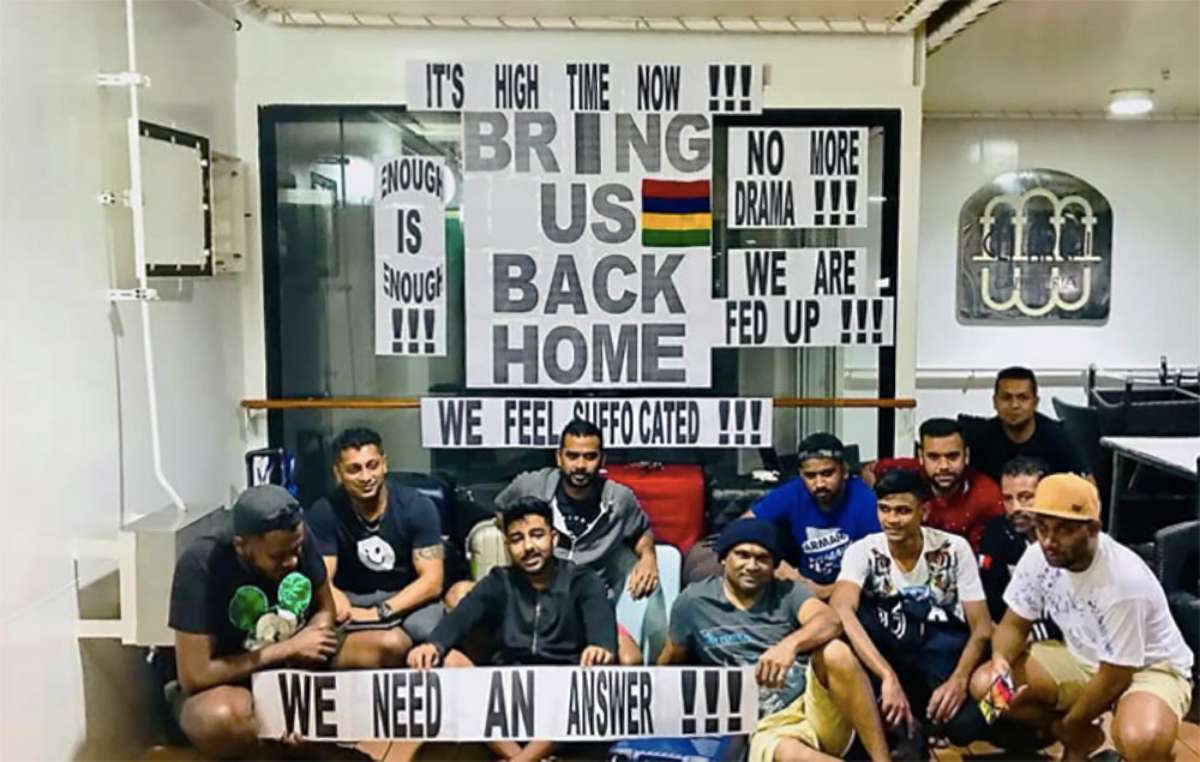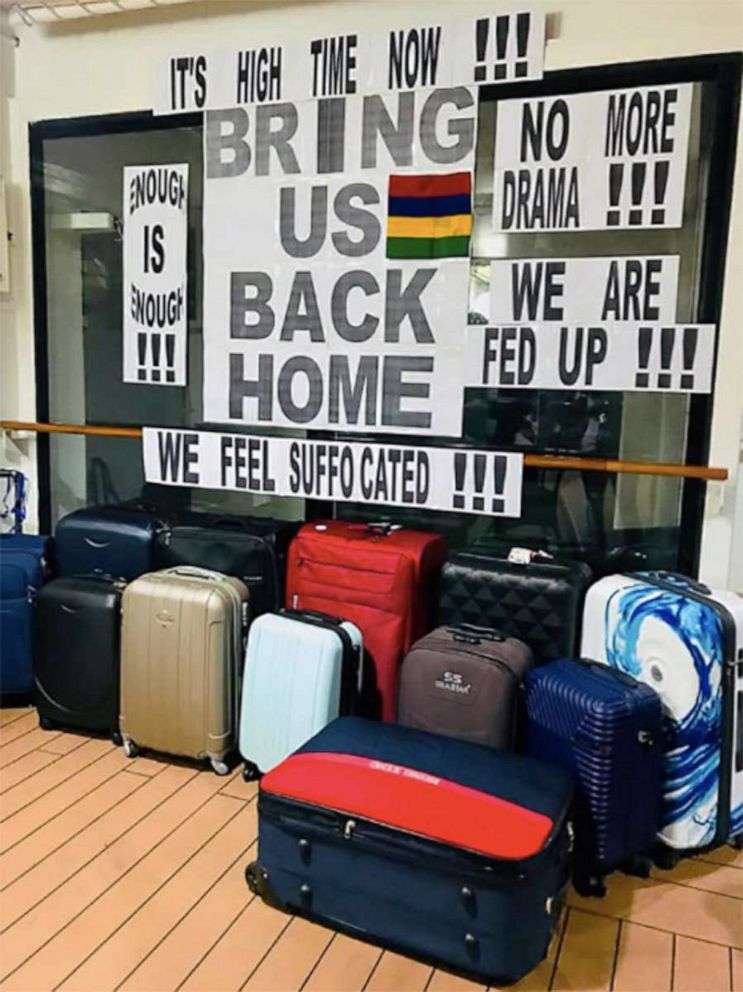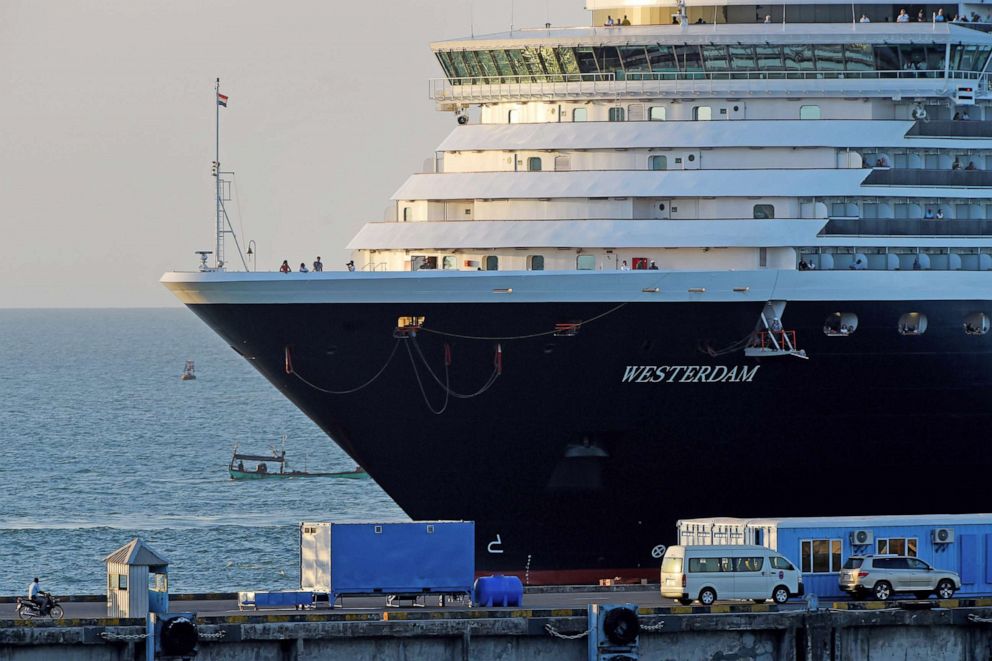300,000 seafarers still stuck on ships: 'We feel like hostages'
"Sometimes we ate only bread and butter, just to fill our stomachs."
Ashchaye Mohitram has not set foot on land since early March.
He's been stuck on an MSC cruise ship since the COVID-19 pandemic forced the cruise industry to shut down most global operations.
"For the past six months we have been struggling to get back home," Mohitram told ABC News. "We feel like hostages here, being far away from our family and not being on land for so long."
The 28-year-old steward said he's one of a group of 103 Mauritian seafarers on three different MSC ships near the port of Santos Brazil. He said he received his last paycheck in March and that the company told him he will only be paid two months of "basic salary" if he doesn't get back on board within six months of repatriation.
"Most of the people here have loans, children and a family waiting at home," Mohitram said, "but they could not do anything or send money home. Some lost their dear ones and could not reach home."
He called being stranded at sea "the worst experience of my life," in part because of the food. Sometimes they had "only bread and butter, just to fill our stomachs. Most of the time we were served only pork and beef. ... I'm just praying to get back on land soon with my family, eating homemade meals."
Mohitram and his coworkers resorted to striking on the open deck of the ship. MSC notified them on Thursday that their repatriation is "currently being finalized with Emirates Airlines and the local Mauritian authorities," according to a letter he shared with ABC News. If it goes as planned, Mohitram will return home Sept. 16 and be quarantined for 14 days.

MSC said in a statement to ABC News that the company had a small number of crew members remaining on some of vessels but that 96% had been repatriated.
"In terms of Mauritian crew members on our vessels in the Brazil area, we have 101 awaiting repatriation currently due to border restrictions in their home country," the statement continued. "We are working hard to get them home as soon as possible despite the challenging circumstances across the world."
'A humanitarian emergency'
The union that represents seafarers, the International Transport Workers' Federation, has been critical of the Mauritian government, accusing them and others of closing borders to its own citizens.
"Getting the seafarers off cruise and cargo vessels has become a humanitarian emergency," the union wrote. "Even if an employer wanted to bring Mauritius seafarers back to their homeland by ship, as many cruise lines have been doing internationally, they are prevented by the Mauritians from berthing and disembarking their Mauritian crew."

The cruise industry has returned home more than 250,000 seafarers from ships around the world over the past few months, according to the ITF. However, an estimated 300,000 like Mohitram remain trapped worldwide, working beyond completion of their international contracts -- most aboard cargo and shipping vessels.
"A tired, fatigued workforce, often working seven days per week, is a recipe for an accident and catastrophe at sea," Jacqueline Smith, ITF's maritime coordinator told ABC News. "We need to protect human life, ships' cargo and our marine environment by getting fresh crew to these ships and giving the current crew a well-deserved rest."
The Coast Guard said that as of Thursday there were almost 10,000 workers still on cruise ships in U.S. waters. This includes an estimated 200 American crew members among 33 vessels.
"There's still thousands on these ships, in large part, I think, for two reasons: one being they don't want to pay for private flights, and there's still some challenges related to flying commercially," Michael Winkleman, a Miami-based maritime attorney, said in an interview with ABC News. "The other part of it is that they're hopeful that they're going to resume sailing, so they would rather keep crew members on board."
Winkleman's firm has filed a number of COVID-19 related lawsuits against cruise companies on behalf of passengers and crew members.
"Their morale is extremely low," Winkleman said. "We keep seeing there's been a number of suicides, there's been a number of hunger strikes, and it's just a terrible situation for these crew members. This is a class of workers who pre-COVID had very little bargaining power. So imagine now, during a pandemic, when they're trapped on these ships literally thousands of miles away from their homes."
'I still need to sleep with the windows open'
Maiara Leones, 32, worked for Holland America as an international guest services associate. She embarked on the Westerdam on Jan. 13 in Singapore and finally disembarked in late May in Mexico.
"I started to get anxiety to know, like, when I really can go home," Leones said. "I had my first panic attack. We didn't know much about the pandemic. We barely knew the news."
Leones has been battling depression and suicidal thoughts since leaving the ship.

"When I came home, I couldn't believe I was dreaming about the ship," Leones said. "I still need to sleep with the windows open to make sure that I'm on land or things like that, you know, like I cannot go on a boat or something now."
Leones had worked eight contracts on cruise lines, but she has now decided to go back to school to pursue a degree in public relations. She said she has not taken any legal action against Holland America and doesn't plan to, but she is "getting angrier."
The class-action lawsuits Winkleman has filed against Royal Caribbean and Celebrity encompass tens of thousands of cruise workers.
"People love inexpensive cruises where they get to go around the world, but there's a dark underbelly to the industry which is a subclass of worker who are routinely mistreated and taken advantage of," Winkleman said. "That's why cruise ships are often referred to as floating sweatshops, and I think that's a fair comparison."



